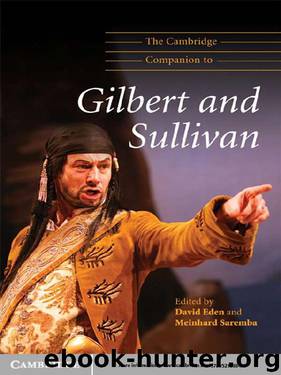The Cambridge Companion to Gilbert and Sullivan (Cambridge Companions to Music) by David Eden & Meinhard Saremba

Author:David Eden & Meinhard Saremba [Eden, David & Saremba, Meinhard]
Language: eng
Format: epub
ISBN: 9781139796422
Publisher: Cambridge University Press
Published: 2009-08-06T03:00:00+00:00
Lasting significance
Herein is the great significance in Sullivan's cosmopolitan musical style, and his larger musical career: he helped his audience to hear music in a different way. Even in the aesthetically unprepossessing genre of comic opera, Sullivan stretched the ears of his audiences so that indigenous music could be recognised not only as having its own voice but also as an outgrowth of a larger international tradition. Sullivan's musical allusions provide precisely that grounding.
In his time Sullivan was not regarded merely as a composer, but as a public musician (in the way we might speak today of a ‘public intellectual’). Even now it is difficult to situate him among his British colleagues: he does not fit naturally among the symphonists Parry, Stanford and Mackenzie, nor the church musicians Goss, Parratt and Stainer, nor his comic opera successors Cellier and German. He has American counterparts in Victor Herbert and John Phillip Sousa and Horatio Parker. Perhaps a closer comparison is Leonard Bernstein. To be sure, Sullivan was not a great educator through words (with no activity analogous to Bernstein's ‘Young Peoples’ Concerts’), but he was an innovative concert programmer – championing Schumann and rediscovering Schubert – in ways not unlike Bernstein's efforts for Haydn and Mahler. Notably, for both Sullivan and Bernstein – and for that matter the versatile Wynton Marsalis – their compositions have been the most criticised of their many musical activities. The phenomenal success of the comic operas played a part in the construction of a national musical sensibility: an audience that sat through a first-act finale at the Savoy one evening was better prepared on the next to hear an Evensong featuring the quasi-‘symphonic’ treatments of the Canticles in the new settings of Stainer and Stanford; Sullivan's word-setting demonstrated that English texts could effectively be set to music even outside of the walls of the church. Most importantly, his facility within a wide variety of current and historical musical styles in both his compositions and his concert programming familiarised his audience with the cosmopolitan musical scene more than any other individual before Henry Wood.
When Sullivan arrived in Leipzig to finish his studies, he looked back in astonishment at the provincialism of the accessible musical life in his homeland. He wrote to his mother on 31 October 1860 that ‘it is my opinion that music as an art in England will go to the devil very soon if some few enthusiastic, practical, and capable young educated musicians do not take it in hand’.21 When he died forty years later, he had done much to improve the situation.
Download
This site does not store any files on its server. We only index and link to content provided by other sites. Please contact the content providers to delete copyright contents if any and email us, we'll remove relevant links or contents immediately.
Aircraft Design of WWII: A Sketchbook by Lockheed Aircraft Corporation(32274)
The Great Music City by Andrea Baker(31898)
Call Me by Your Name by André Aciman(20466)
The Secret History by Donna Tartt(18998)
The Art of Boudoir Photography: How to Create Stunning Photographs of Women by Christa Meola(18602)
Shoot Sexy by Ryan Armbrust(17712)
Plagued by Fire by Paul Hendrickson(17391)
Portrait Mastery in Black & White: Learn the Signature Style of a Legendary Photographer by Tim Kelly(16993)
Adobe Camera Raw For Digital Photographers Only by Rob Sheppard(16956)
Photographically Speaking: A Deeper Look at Creating Stronger Images (Eva Spring's Library) by David duChemin(16668)
Ready Player One by Cline Ernest(14615)
Pimp by Iceberg Slim(14464)
Bombshells: Glamour Girls of a Lifetime by Sullivan Steve(14038)
The Goal (Off-Campus #4) by Elle Kennedy(13640)
Art Nude Photography Explained: How to Photograph and Understand Great Art Nude Images by Simon Walden(13021)
Kathy Andrews Collection by Kathy Andrews(11793)
The Priory of the Orange Tree by Samantha Shannon(9044)
The remains of the day by Kazuo Ishiguro(8947)
Thirteen Reasons Why by Jay Asher(8873)
